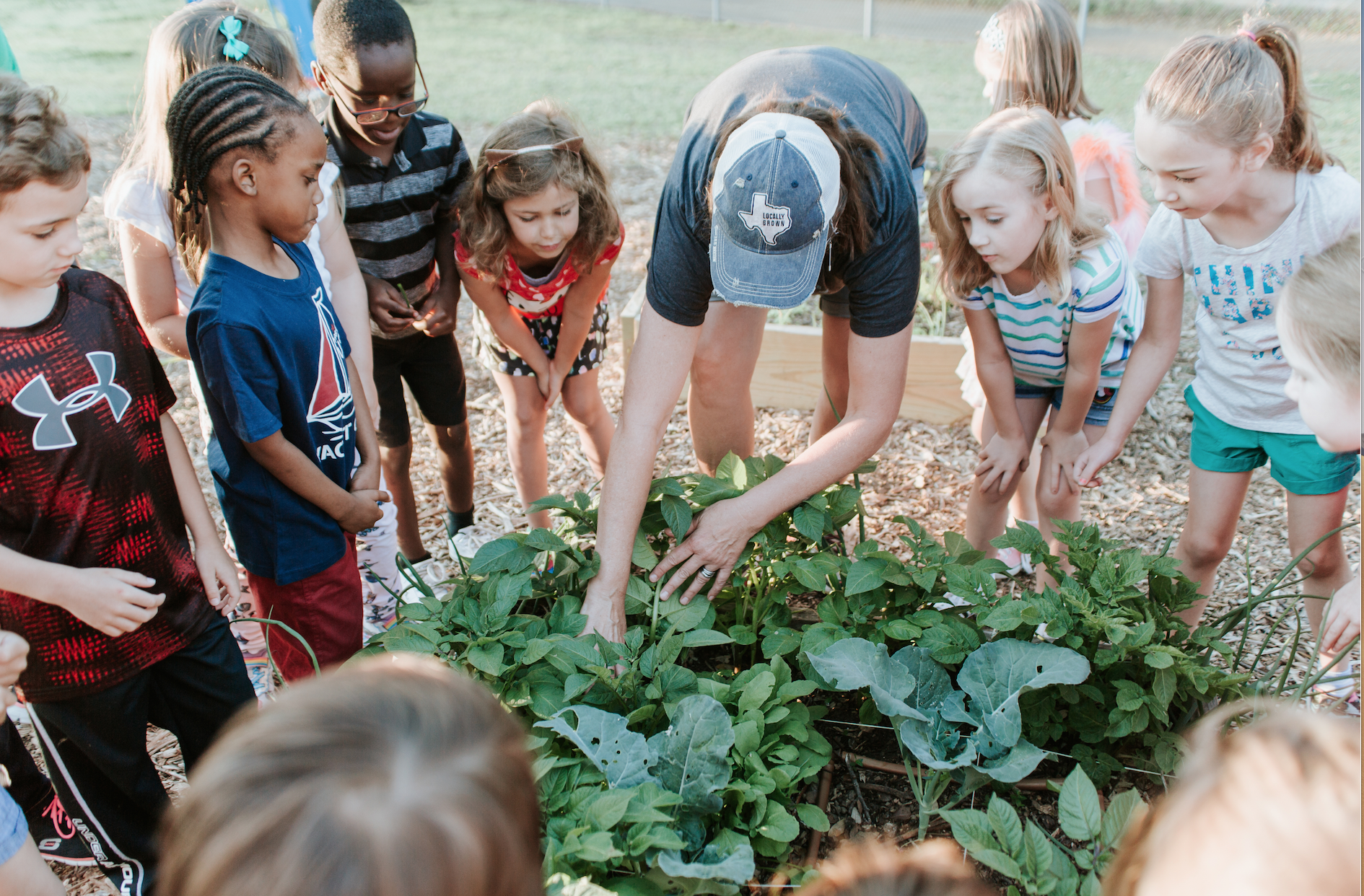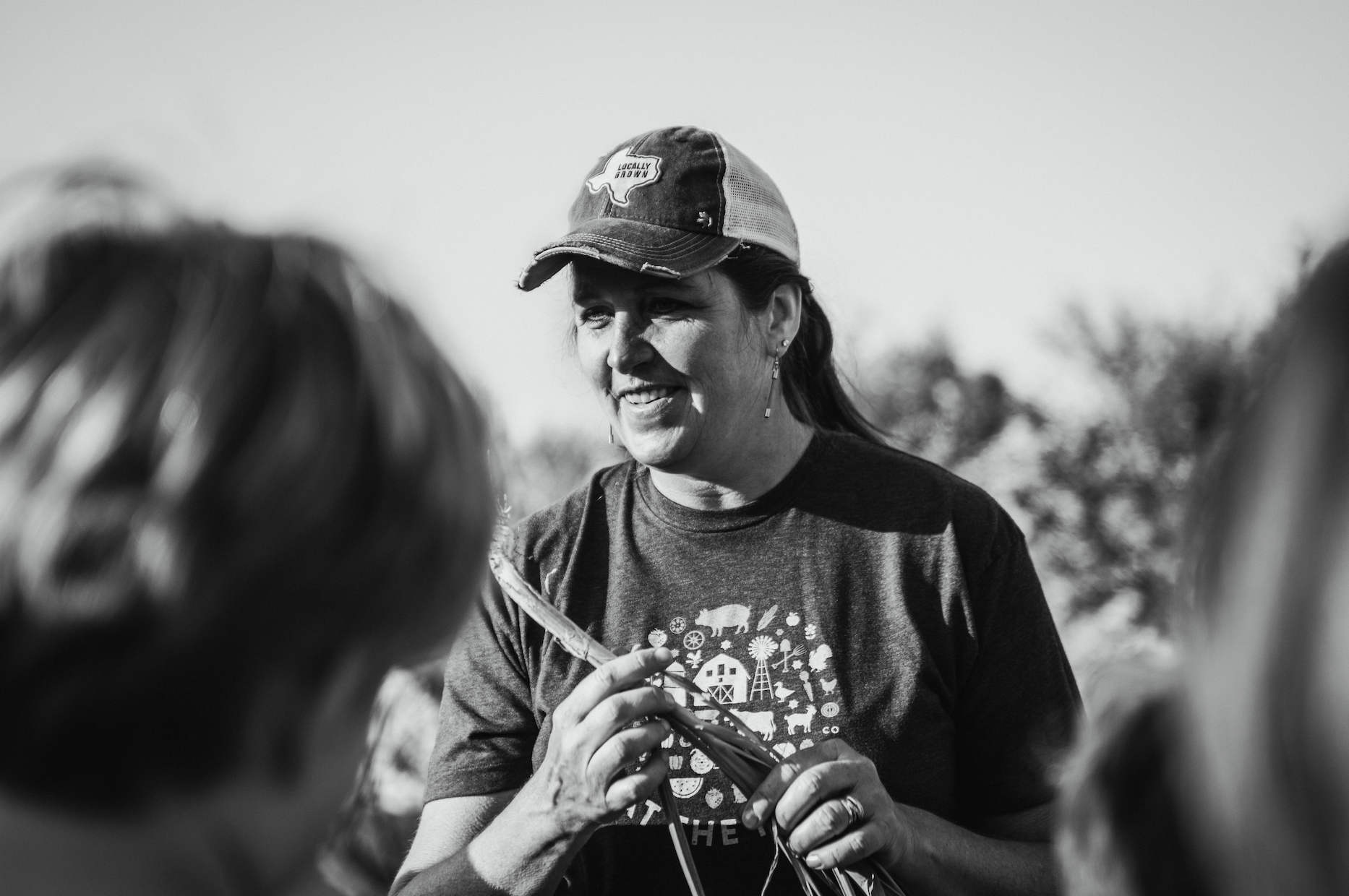Our garden is cultivating tomorrow’s community-minded leaders, deeply rooted in healthy living, educational growth and environmental stewardship.
–Mission Statement, Moss Haven Farm
At school dismissal, Jackson came running toward me with a huge green onion in his hands. “We can cook this tonight,” he shouted joyfully as he swung the gangly vegetable above his shock of strawberry blonde hair. And then, from his pocket, my son pulled three cloves of garlic, “We went to the farm today. It was harvest day for my class.”
That night as I prepared dinner, I used the garlic in the marinara sauce. I sliced verdant circles from the onion and mixed them in our salad. Jackson, a precocious 7-year-old, noted that the garlic “livened up” the meal. At one point, as Jackson picked through his salad, he popped a piece of the green onion in his mouth. His face spoke otherwise but Jackson maintained his composure and announced, “It tastes so fresh—right out of the garden.”
If that onion had been from the grocery store, Jackson wouldn’t have touched it. And he would have eaten enough of his pasta to negotiate a dessert. But because Jackson grew the food with his class, he appreciated it. They worked the soil, planted the seeds, watched sprouts rise up from black earth, and tended their garden until it was ready to consume.
The Moss Haven Farm is a treasure in our East Dallas community. With raised beds for every class, a Texas Natives garden, a rainwater harvest system, a custom chicken coop, and a sitting area for group discussion carved out of tree stumps, it’s no wonder that this all-organic farm has become the gold standard in North Texas.
Students visit the farm on a weekly basis and Farmer Kim Aman connects agricultural learning to science curricula. But the farm “classroom” has ubiquitous effects back inside the school building. Jackson’s teacher, Megan Grizzaffi, told me “We are constantly referring back to experiences on the farm.”

For instance, students make connections in social studies. Ms. Grizzaffi explained that her first graders learned about how different communities “grow crops for food, but others might not have good weather or soil to grow crops.” Her class connected this concept to the selection of crops and seasonality of planting for optimal results in here in Dallas.
And the connections don’t stop with the little ones. Sixth graders sell their herbs at the farmers’ market and learn about the basic tenants of business.
On Fridays, students visit the salad bar and assemble part of their lunches with vegetables from the farm. When they finish lunch every day, students as young as kindergarten know to discard uneaten organic materials in the compost bins.
Moreover, the farm connects our small elementary school with the greater community—in small ways like neighbors moving mulch for farm clean up or bringing old Halloween pumpkins to our compost bins and in big ways like donating over 2500 lbs of food from our Community Giving Garden to the North Texas Food Bank. Recently, the school held an art contest where students created their own vegetable characters or super heroes. Moss Haven partnered with El Centro Community College and students from their welding program fashioned large-scale versions of the winners. Not only do these large metal veggie-heroes add whimsy to the farm, they are a great reminder of the farm’s connection to the outside community.
This wildly successful school farm started as an after-school program. Kim Aman, a classroom teacher, along with the Garden Committee, used PTA funds to build 20 raised beds, install a water tank, and purchase a storage shed. A seventh-generation farmer and avid gardener, Kim volunteered her time at first. “I have always loved taking my classes out to work and learn, so I jumped at the opportunity of creating an outside learning space,” she recounted. Student interest in the after-school farm program skyrocketed and classroom teacher Ms. Aman transitioned to Farmer Aman. After school enrichment became in-school instruction following the Texas state standards for STEAM education.

While Kim Aman is now the Farm Director and remains a key player in this endeavor, there are many women who make the farm happen. The female positioning in the history of this enterprise is, I believe, the hallmark of the farm and speaks to the strength our community. There is, in a sense, a “village” of women who have come together to establish, maintain, and build the future.
Tiffany Walker, former head of the Farm Board, notes that the farm’s longevity and impact is “directly tied to the volunteer Farm Board, dedicated Farm Director, and the many small and big ways the community makes contributions that strengthen the farm’s roots.” The Farm Board is made up entirely of women. It meets monthly and oversees budgets, writes grants, assembles service days, manages after-school and summer camp opportunities, and organizes events like A Peep the Coops, a community-wide tour of urban chicken coops in East Dallas. In fact, I’m in charge of reviewing applicants for the tour this year.
Funding for the school farm does not come from the district as one would expect. Moss Haven’s PTA provides over half the funding for the farm (the rest is from corporate grants, personal giving, and summer camp revenue). The PTA holds several fundraisers throughout the year, the biggest of which is a themed auction. Last year, this auction raised over 150K for the school. There is a strong female presence in the PTA too. Of course, there are amazing dads who volunteer but the PTA Executive Board is all female and the Auction Chairs, responsible for gathering solicitations and putting on a fabulous event, are women.
The Moss Haven Farm is a wonderful example of what happens when women collaborate and use their talents for the good of the collective, especially the community of children. In film, television, and zeitgeist, PTA moms are caricatured as harried women in yoga pants with messy minivans and too many activities. Or they are portrayed as type-A women in Tory Burch flats, fueled by Starbucks and ambitions of being the biggest fish in the tiny pond. You just don’t see this at Moss Haven’s farm. The farm has an attitude that says Come as you are. Help when and where you can. Your talents are needed and appreciated. The fruits of that attitude can be seen in grants from big companies, rising property values, and first place ribbons at the Texas State Fair (a big deal for city kids!).
The current culture of parenting is characterized by individuality. Each parent raises her child her own way. Each parent knows what’s best for his own family. And that’s a good thing. But the beauty of creating and investing in community can get lost in that mindset.
Not at Moss Haven Elementary. This community raises its kids together—in partnership with each other, with teachers, and even with nature. I see the benefits of the farm every day. Because of Jackson’s experience gardening and caring for the chickens on the Moss Haven Farm, he’s more mindful of the world around him. It’s remarkable to see a 7-year-old become a conscious steward of his body and gain respect nature.
Kristin Sample is a writer and English teacher. Her by-lines can be found in The New York Times, The Washington Post, Parents, Read Write Think and The Dead Mule School of Southern Literature. Her novel North Shore South Shore is available on Amazon. Follow her on Instagram and Twitter @kristinsample.
Images by Mandy McGeath Photography. Instagram: @mandymcgeathphoto

